Have you ever been to the Pacific? Sometimes emerald, sometimes turquoise, sometimes sapphire and always precious – my childhood dream to see it and breathe it came true in February 2014. Although it would be enough for me to go to the Far East of Russia, it is far more exciting to visit a tropical country which is hotter than my country’s summer and even my body’s temperature.
My month-long trip to the Pacific islands seemed such a tremendous idea that my mind could hardly grasp it. First of all, because the road took two days to get there and two days back – four days in total for airplane thoughts, reflections upon my life, reading good books and thinking while crossing 12 time zones. Secondly, and the most importantly – I was supposed to finally see my boyfriend who works in the Pacific region, whom I had not seen for more than four months and whom I was supposed to leave again after my Pacific vacation was over. To my surprise, my acclimation took only one day, which was enough time to get used to warmth, and Fiji–its sultriness and variety of exotic fresh fruits.
My journey took me from Kazan to Moscow to Seoul, and brought me to Nandi – Fiji’s tourist capital situated on the biggest island of the archipelago – Viti Levu. There my boyfriend was waiting for me with a bouquet of suspicious flowers–you know, similar to those exotic predator roses, which can bite off your finger, but still attractive because of their mysteriousness.
Nandi is a fascinating Fijian city. However, if, when choosing a place to stay, you decide between Nandi and something else, go for something else. Nandi can only be described in one word – touristy. There are so many people, a dirty gray beach, and an ocean nearby resembling a salty puddle. But the international airport, the biggest hub connecting Asia and the Pacific region, is located in Nandi. Thus, 50% of those staying in Nandi are those who have long transfers.
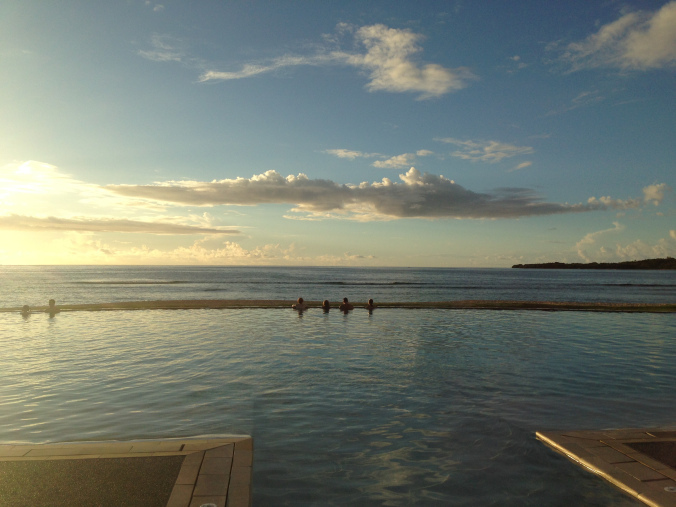
Natadola Beach, Viti Levu, Fiji
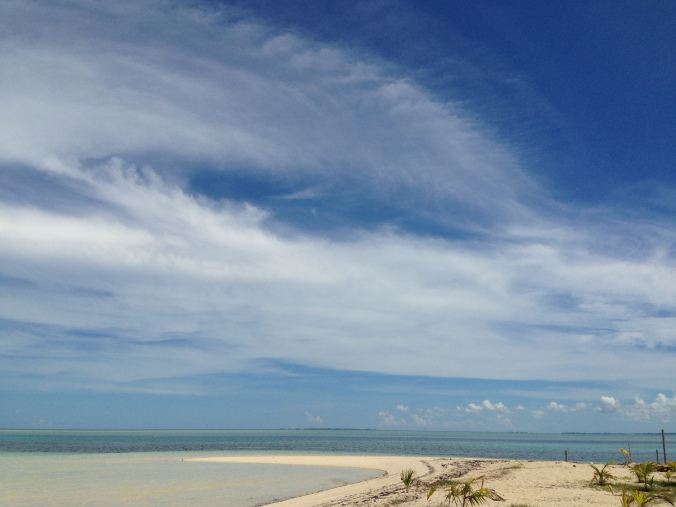
Leleuvia Island Resort, Fiji
However, if you happen to be a transit tourist in Nandi, Smugglers Cove is the best place to stay: they provide comfortable rooms at a moderate price, information for tourists, an ATM, as well as equipment to enjoy yourself in the ocean.
Wherever you go, the locals scream, “Bula!” which means “Hi there!” and offers you some services. If you enter a shop without buying a souvenir, you will feel ashamed. In Nandi, however, there is a great Japanese restaurant called Daikoku, which is famous even among the tourists. Its cooks and services will make you love sushi and fried rice even if you were not a fan of them before.
Having spent one day in Nandi, we hired a car. The most budget variant in Fiji is Sharma’s Car rentals. You can grab your vehicle both in the city center and at the airport, as well as book it online. A not too old Toyota with insurance and one liter of gasoline costs around 450 Fiji dollars (FJD). It would be possible to reach the opposite point of Viti Levu in just five hours and arrive at Fiji’s capital, Suva. But there is no way to escape from gorgeous little or a slightly larger beaches, which you’ll pass along the way. “Choose your own paradise!” – could be an excellent motto for Fiji! We could not help stopping at one of them, called Natadola.
Honestly, it is hard to compare Natadola Beach with anything else. Any creative writing epithets would seem too vulgar and banal for it. In fact, it is better to keep silence and contemplate.
I fell in love with the Pacific because of its solitude. European beaches are excellent, no doubt–as excellent as the Old Continent’s facilities and services. However, you need to spend half of your life searching for a hidden sandy paradise, far from people. In Europe you will never feel like a Robinson. Neither will you get a rest from crowds and voices. There will always be somebody to spray sand on your tanning back when running to the sea or playing badminton nearby. Or there might be some seller of beer or coconuts to distract you from an interesting book.
In Fiji’s beaches you may stroll for hours and hours along a white sandy strip, fall asleep and get burnt under a palm tree or in a hammock. At times, personnel from a nearby hotel may come to offer you a drink or spa services. But it happens so rarely, that it never disturbs your harmony.
Thus, after resting at Natadola Beach, we reached Suva by the end of the day. I was impressed. The city is situated on a hill and extremely busy, with businesses, trading centers, and a developed infrastructure. In Suva, you can find the ocean, university, shopping malls, and European-looking cafes. Crowned with Suva, Fiji is considered to be one of the most economically developed states in the South Asia Pacific.
In Fiji’s beaches you may stroll for hours and hours along a white sandy strip, fall asleep and get burnt under a palm tree or in a hammock.
Despite this, take care. Living in a 4 or 5-star hotel is not equal to living a local’s life, which includes renting an apartment, cleaning the house, paying bills and going shopping. Thus, when I entered Gloria Jean’s Coffees, a European-looking coffee shop in Suva city center, to grab some breakfast for us, the last thing I expected to see there was a fat tropical cockroach, probably waiting for a coffee as well. Do not be scared of unknown animals and insects, but take into consideration the fact that in the tropics everything is exaggerated. Green is greener, red is redder, the amount and variety of creatures is doubled, as is the variety of flowers and fruits.
On our next stop, we also discovered that there is also more beauty in Fiji than anywhere else. After spending one day in Nandi, another day in Natadola and 24 hours more in Suva, we finally reached our main and most desirable destination, a paradise which we had chosen ourselves.
Fiji archipelago abounds in tiny islands occupied by monopolist hotels, one of which is Leleuvia Island. The screaming waves of the Pacific do not reach the Eastern part of Viti Levu, crashing against thousands of inlets inhabited by gorgeous magnolias. In our 40-minute boat ride from the big island to Leleuvia resort, we felt like we were flying in the sky. The crystal clear lagoon was absolutely still, and reflected every single cloud and every single seagull diving for its fish breakfast:

On the way to Leleuvia Island
The tiny Leleuvia Island could be seen within half an hour. Its exciting calmness is ideal for a tired body and mind and essentially prescribed for working people who have not taken any vacation in a long time. Thus, dear independent ladies working full-time, go for it and you will feel like a renewed person in just three days. This is what happened to me there.
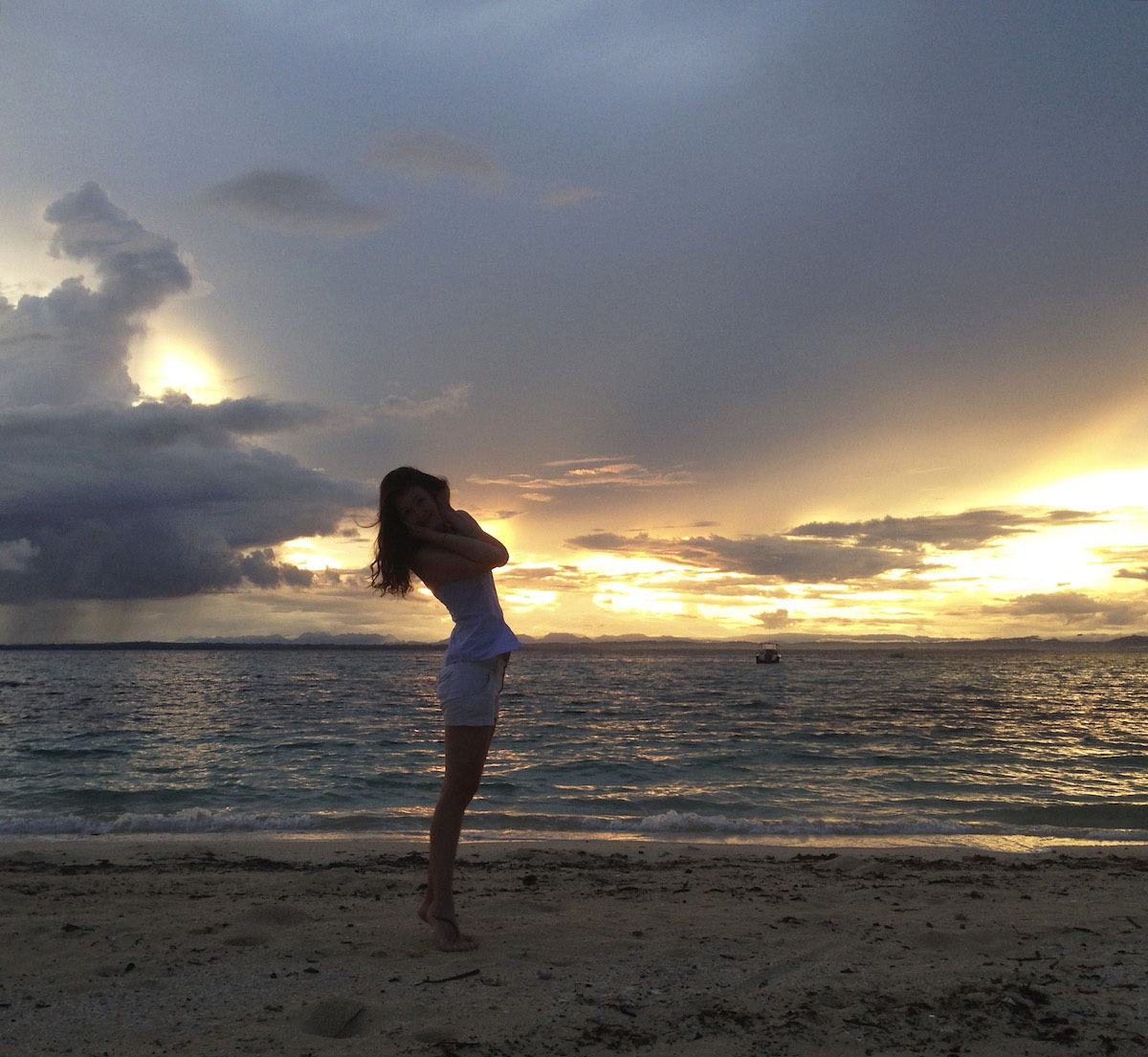
Alisa, a renewed person
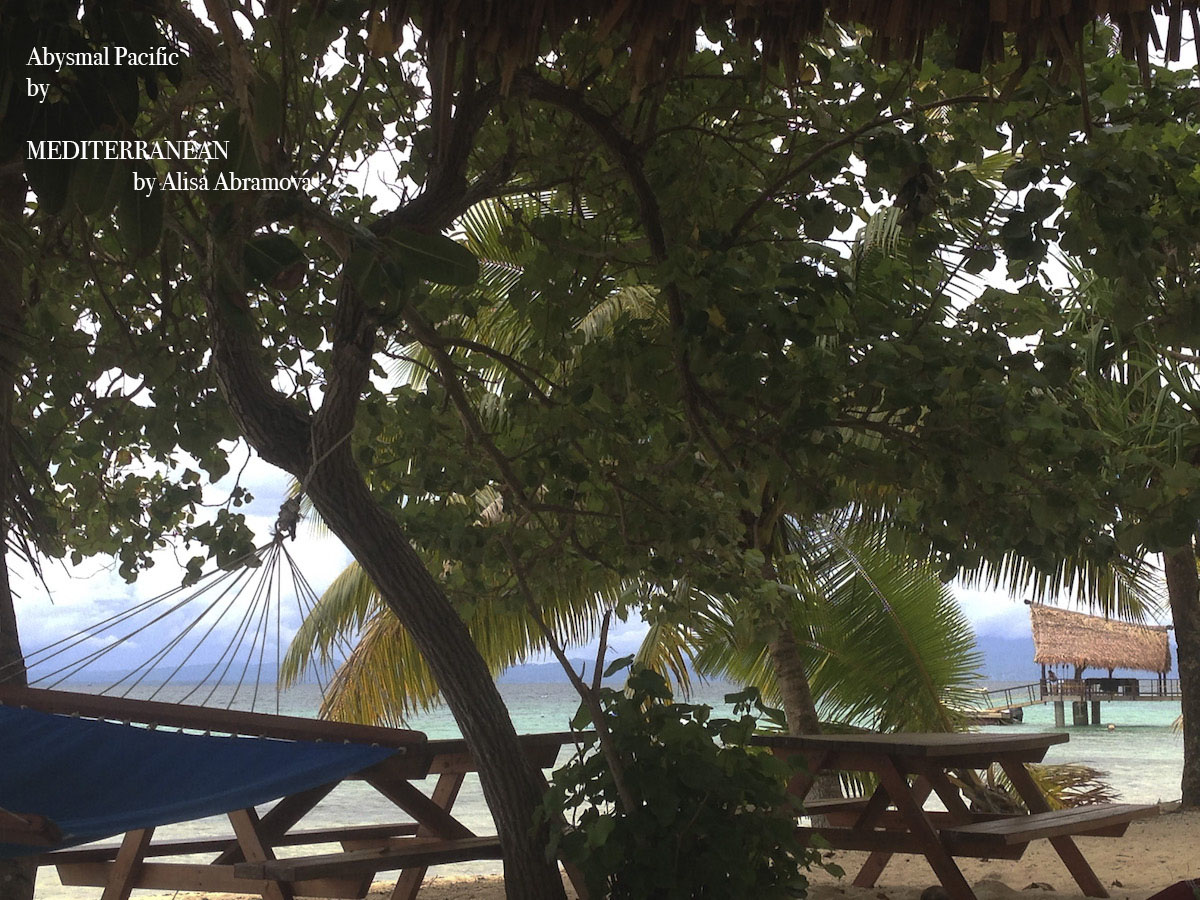
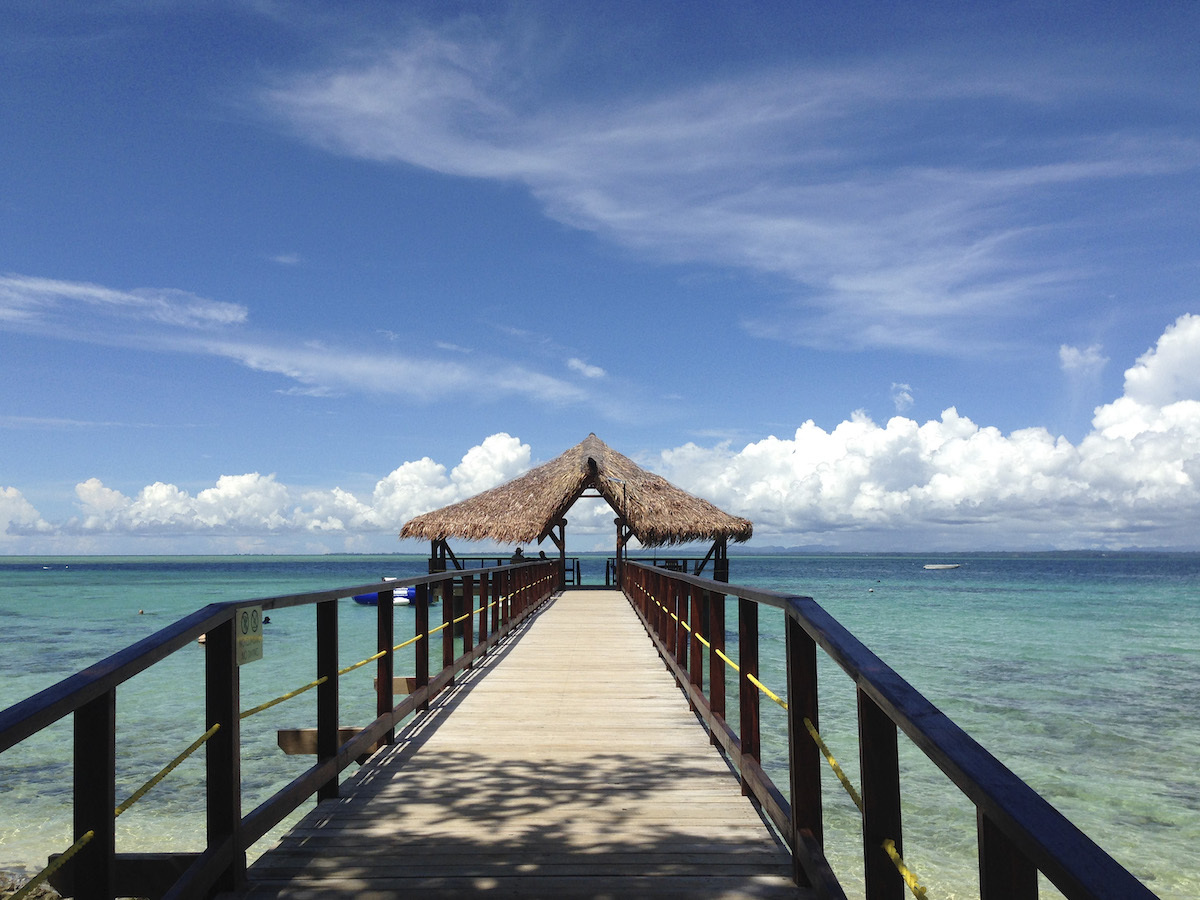
The hotel comprises tens of private bungalow-style huts, the majority of them situated on the beach strip, with a bench and a hammock outside – so that you can contemplate the marvelous ocean view and never even come across your neighbor. During the daytime, you can indulge on traditional continental cuisine, snacks and drinks, as well as fabulous services like hiring kayaks and snorkeling equipment.
Another great thing to do is to take a tour to Levuka, Fiji’s former capital, which you should visit if you want to dive into Fiji’s history. The city was established in the XVIIIth century by sandal wood sellers and had its golden age during the British colonization, at the moment inscribed in the UNESCO world heritage list, for keeping its authenticity through the centuries.
Well, however, where everything started for Fiji was where it all finished for me: we had to return to Suva and Nandi airport, as the next country expecting us was Western Samoa – a trip deserving a separate story which I will share with you in Part 2 😉
However, before saying goodbye, I would like to return to the cockroach. Not exactly to it, but to tips for your travels to Fiji:
1. The Fiji islands know how to receive guests, and hospitality management is really developed there. However, there is a high degree of crime.
Though tourists may not be a target, anything can happen. Rape is rare as well, but be cautious, especially if you decide to leave your cozy hotel and walk around a local village. Wear your wedding ring (real or fake one), create stories about your husband or boyfriend waiting for you at the hotel and of course, do not show too much of your body – “no” to swimsuits, “yes” to long dresses. Remember that you should not carry coal to Newcastle, as the British say.
2. Life outside of the hotel is full of dangers.
If you are not prepared to wake up with lizards in your bed, do not rent an ordinary apartment. Instead spend time finding a good hotel–and prepare to pay for it.
3. The most dangerous animal in Fiji is a centipede.
Tigers, leopards, crocodiles and other romantic animals do not live there. Many websites on tourism speak about jellyfish, sharks and banded sea snakes. However, as locals say, they are more afraid of people than you might be afraid of them.
4. Beware of dengue fever.
Epidemics of this unpleasant disease happen in Fiji sometimes. Dengue is transferred by mosquitos, and my boyfriend was lucky enough to catch it. Yes lucky, because, according to the locals, after surviving dengue, you get lifelong immunity. However, according to doctors, there are four types of this fever and you get immunity against only one. Its symptoms are similar to poisoning. You might also experience pain in joints, asthenia, gum bleeding and extremely high temperature. The only medicine is water. I am sure this is not the experience you would like to have in Fiji so stay hydrated and constantly use a repellent during an outbreak!
5. Despite the attractiveness of scuba diving, snorkeling and observing magic corals, you should never immerse your limbs in that underwater tangle.
First, there is a slight possibility of getting a poisonous kiss from a scorpion fish. Second, there is a high probability of cutting yourself on coral (as they are quite sharp) and getting blood poisoning.
6. Protect yourself from the tropical sun.
I am sure you have already taken all preventive measures, but I still need to remind you. If you do not want to turn into a German sausage, pack an SPF 50 lotion, even if you have a swarthy skin. Fijian sun is as poisonous as a scorpion fish.
Sincerely,
Alisa Abramova
Read more
Alisa Abramova, a Chaos Manager
Алиса Абрамова, хаос-менеджер на полной ставке
I do meet interesting people! Notes from Dubai
Интересных людей я встречаю: заметки из Дубая
SimBIOsi Restaurant in Florence
Recent
Alisa Abramova, a Chaos Manager
One Morning in London: A Cucumber, a Rubber Rat, and Whatever May Happen
I do meet interesting people! Notes from Dubai
Beauty, Inspiration, and a City Reaching for the Sky: A Hong Kong Travel Guide
Explore Ocean Park Hong Kong: Pandas, Sharks & Environmental Education
SimBIOsi Restaurant in Florence
Place: Sea You Beach Bar in Paphos. Shells, Coconuts and XXL Crepes